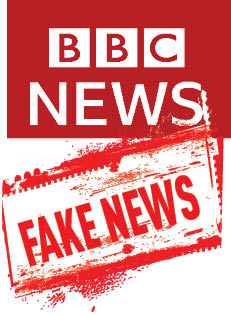The series is guilty of spreading deliberate misinformation, disinformation and relying on hearsay to make outlandish claims that were dismissed by the Indian courts, including the Supreme Court, when the Congress was in power at the Centre.
NEW DELHI: UK broadcaster, BBC has released the first of a two-part documentary on Indian Prime Minister Narendra Modi, leading to major outrage in India and among the diaspora around the world as being a propaganda film intended to destroy India-UK relations, as well as to weaken British Prime Minister Rishi Sunak’s standing, by not letting him offer a hand of friendship to India and strike the free trade agreement that the two countries are expected to sign this year. “The Modi Question” is based on allegations that were dismissed by multiple levels of the judicial system in India for over a decade, and that too when the Congress party was in power at the Centre and Narendra Modi was an opposition Chief Minister in Gujarat.
The series is being held guilty of spreading deliberate misinformation, disinformation and relying on hearsay to make outlandish claims. The documentary has been criticised even by Rishi Sunak.
This is not the first time that the UK based news channel has come under fire for “manufacturing” and “colouring” stories. They have done it in the past too.
The BBC projects “activist” Teesta Setalvad as a “martyr” fighting for the protection of human rights in the documentary, when the fact is that in June last year Setalvad was arrested only after the Supreme Court dismissed a petition challenging a lower court’s refusal to file a case against Prime Minister Narendra Modi in the Gujarat violence of 2002. Teesta Setalvad was accused of lying and an FIR was lodged after which she was arrested “for a conspiracy to send innocent person to jail”.
“At the end of the day, it appears to us that a coalesced effort of the disgruntled officials of the State of Gujarat along with others was to create sensation by making revelations which were false to their knowledge… As a matter of fact, all those involved in such abuse of process need to be in the dock and proceeded within accordance of law,” the Supreme Court had said.
Two days later, the Gujarat police arrested Setalvad and claimed (as reported by The Sunday Guardian, “Ahmed Patel conspired to implicate Modi, topple govt post Gujarat riots”) “that the late Congress leader Ahmed Patel, who was the political secretary to party chief Sonia Gandhi, in a larger conspiracy, colluded with activist Teesta Setalvad, former IPS officers Sanjiv Bhat and R.B. Sree Kumar to ‘destabilize or dismiss the elected government in Gujarat by hook or crook for which Setalvad obtained illegal financial
Similarly, the documentary falsely claims that one of the main issues addressed in the documentary is the 2002 Godhra carnage, where 59 Hindus were killed by a local Muslim mob in a fire on the Sabarmati Express train. The series terms the incident as “disputed”.
The reality is that the incident has been thoroughly investigated and the conclusion was that it was not an accident but rather an act of arson. A Special Investigation Team (SIT) appointed by the Supreme Court and headed by Justices G.T. Nanavati and Akshya Mehta found that petrol was used to set the train on fire. 31 Muslim individuals were found guilty of the massacre by a trial court, with 11 receiving the death penalty and 20 receiving life in prison. These convictions were later affirmed by the Gujarat High Court in 2017, resulting in everyone receiving a life sentence. The Nanavati Commission report also found it to be an act of arson. The Nanavati Commission did not find any evidence of involvement of the then Chief Minister or any other ministers in the riot.
Also the documentary has not only glorified Teesta Setalvad but also individuals such as R.B Sreekumar, and Sanjiv Bhat. All three have been found to have been guilty of questionable conduct, and all their testimony has been disproved in multiple courts in India. The SIT investigation found that most of the testimonies given by these individuals were based on hearsay and had no concrete or material evidence.
The BBC documentary has also claimed that Ehsan Jafri (former MP of Gujarat) called the then Chief Minister Narendra Modi for help. However the reality is that there is no proof till date to substantiate the claim that Ehsan Jafri called Narendra Modi for help.
The documentary also claimed that R.B. Sreekumar, the then Addl. DG (Int.) had claimed that K. Chakravarthi, the then DGP had informed him that the then Chief Minister Narendra Modi on 28 February 2002 had said in the meeting “Let Hindus vent their anger”. But as per the SIT report, “Shri Chakravarthi has denied that he held any such talks with Shri R.B. Sreekumar. Even otherwise, the version of Shri R.B. Sreekumar becomes hearsay and inadmissible in view of denial of Shri K. Chakravarti…”
Even Sanjiv Bhatt had made a similar claim that he had heard the Chief Minister say this, but it was discovered by the SIT that Bhatt was not even present at the meeting.
Incidentally, Sreekumar has been accused of framing ISRO scientist Nambi Narayan in a false spy case and thus hurting India’s space programme.
The BBC documentary has also made wrongful and erroneous attribution over the murder of the former Home Minister of Gujarat, Haren Pandya. The documentary has questioned the judicial proceedings in this case while casting aspersions. In reality, the Supreme Court in its 234-page judgment convicted all the 12 accused who were convicted by the trial court but were acquitted by the high court. The SC dismissed the application of a private organisation stating that there was no ground for fresh probe. However, the documentary of BBC floats a conspiracy theory on the murder of Haren Pandya.

